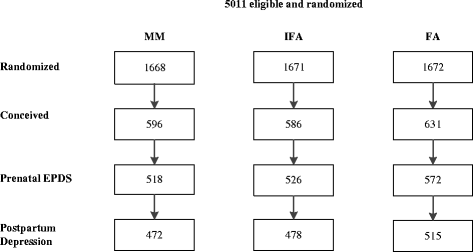Impact of preconceptional micronutrient supplementation on maternal mental health during pregnancy and postpartum: results from a randomized controlled trial in Vietnam
- PMID: 28623904
- PMCID: PMC5473979
- DOI: 10.1186/s12905-017-0401-3
Impact of preconceptional micronutrient supplementation on maternal mental health during pregnancy and postpartum: results from a randomized controlled trial in Vietnam
Abstract
Background: Micronutrient malnutrition has been associated with maternal depressive symptoms (MDS), but little is known about the effects of preconceptional micronutrient supplementation. This paper examined the effects of preconceptional micronutrient supplementation on MDS during pregnancy and postpartum.
Methods: We used data from a double-blind controlled trial (PRECONCEPT) in which 5011 Vietnamese women were randomized to receive weekly supplements containing either a) multiple micronutrients (MM) b) iron and folic acid (IFA) or c) folic acid (FA) until conception (n = 1813). Maternal mental health was assessed using the Center for Epidemiologic Studies Depression Scale (CES-D) at baseline (preconception), and the Edinburgh Postnatal Depression Scale (EPDS) during pregnancy and 3 months postpartum. Elevated MDS was defined as EPDS score ≥ 4. All group comparisons were done using ANOVA or chi-square tests of proportions intention to treat and per protocol analyses (women consumed supplements ≥26 weeks before conception). We also conducted stratified analyses by preconception CES-D scores, underweight, or anemia status using generalized linear models.
Results: Baseline CES-D scores were similar across treatment groups. The proportion of women experiencing elevated MDS was 11.3, 8.1 and 4.9% at first, second and third trimesters of pregnancy, respectively, and 3.6% at 3 mo postpartum. Mean EPDS scores at first (1.5 ± 2.7), second (1.1 ± 2.4), and third trimester of pregnancy (0.7 ± 2.0) and early postpartum (0.6 ± 1.8) were low and did not differ by treatment group. However, among women in the highest tertile of CES-D scores at preconception, mean EPDS scores in the first and second trimesters of pregnancy were lower in the MM and IFA groups compared to FA only (P < 0.05).
Conclusions: Weekly preconceptional micronutrient supplements containing iron did not improve depression measures relative to folic acid alone among all women, but may have benefitted women who were at risk for depression.
Trial registration: The trial was registered retrospectively at ClinicalTrials.Gov as NCT01665378 on August 13, 2012.
Keywords: Mental health; Multiple micronutrient; Preconception; Randomized controlled trial; Supplement; Vietnam; Women of reproductive age.
Figures


References
-
- WHO. Maternal mental health and child health and development in low and middle income countries: Report of the meeting held in Geneva, Switzerland, 30 January - 1 February, 2008. http://www.who.int/mental_health/prevention/suicide/mmh_jan08_meeting_re.... Accessed 15 Oct 2016.
-
- Center on the Developing Child at Harvard University. The Foundations of Lifelong Health Are Built in Early Childhood. 2010. http://www.developingchild.harvard.edu. Accessed 15 Oct 2016.
Publication types
MeSH terms
Substances
Associated data
LinkOut - more resources
Full Text Sources
Other Literature Sources
Medical
Research Materials
Miscellaneous

